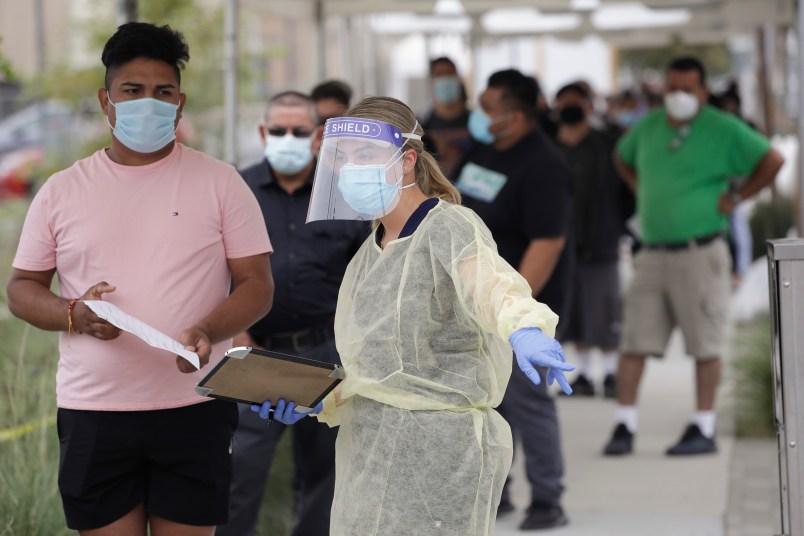With two COVID-19 vaccines on track for approval by the end of the year, the country is preparing to inoculate frontline health-care workers and the most vulnerable.
But while the vaccine has been found to confer immunity on those who take it, it’s still not clear whether the shot stops transmission. Researchers are racing for an answer to the question of whether those who are inoculated are also incapable of spreading COVID-19.
Not all vaccines put a stop to both illness and spread. Some vaccines for respiratory diseases stimulate the body’s immune response but allow the virus to remain in the respiratory system, facilitating transmission.
Specifically, an antibody that exists in the mucus and saliva can fail to be activated even as blood-borne antibodies effectively prevent disease.
“With respiratory illness in particular, transmission is dependent on whats in your nose and nasal pharynx,” Dr. Litjen Tan, chief strategy officer at the Immunization Action Coalition, told TPM. “You can be asymptomatic, but you’re spitting out virus.”
Because so few people have gotten the injections so far, there’s not yet data to measure how effective the Pfizer and Moderna vaccines are at curbing spread. More information could reveal the extent to which the vaccines prevent spread, and further studies could reveal how soon after receiving the dual shots people become unable to spread the virus.
It’s “not clear whether or not these vaccines actually do prevent transmission,” Josh Michaud, an epidemiologist at Kaiser Family Foundations, told TPM last week. “We know they’re effective in preventing disease. But they haven’t tested whether or not a person who is vaccinated can still transmit.”
Life in the nose
The answer to the question of whether the vaccine will prevent only serious illness, or curb both illness and transmission, could shape how the country experiences and responds to the virus in 2021.
A vaccine that’s effective at curbing transmission could bring an earlier end to the virus, while a vaccine that only stops serious illness without preventing spread could result in a situation in which case rates continue to rise even as death rates go down due to the most vulnerable getting shots first.
It would be “unusual” but not unheard of for a vaccine to allow further spread of the virus against which it protects, said Dr. William Schaffner, an immunologist and professor of preventive medicine at Vanderbilt University.
The meningococcal vaccine, for example, has been found to allow people to continue to carry and spread that disease even while they are immunized.
Moderna said this week that it expected to have results in three weeks regarding how effective its shot is at stopping transmission. Schaffner said that data released by the FDA suggested that Pfizer’s vaccine was likely to be at least somewhat effective at limiting spread.
Researchers will likely look at the population effects of early vaccine use, to see if there are any changes in transmission. Blood tests could also determine, on a small scale, whether people who received the vaccine were subsequently infected with the virus.
‘Predictable’
The timing over when the pandemic begins to taper off largely depends on how effective the vaccines end up being at limiting transmission.
Tan suggested that between 65 and 75 percent of the population would need to be vaccinated or have acquired immunity through exposure to COVID-19 to head off further outbreaks, assuming that the vaccines provide both long-lasting protection to the disease and fully eliminate the potential for spread.
“Other factors shape that — how long will that immunity last?” Tan said. “If it’s short term, you’re gonna have to vaccinate more people.”
But that could then present a thorny problem for public health officials who, Schaffner said, would want to not only “preserve” but “enhance” measures to mitigate the virus as more people get vaccinated.
“Its going to take a long time to vaccinate a lot of people, and we’re going to have to do social distancing, mask wearing, the whole drill, to keep the virus as low as possible,” Schaffner added.
Gary Slutkin, an epidemiologist who fought pandemics as a WHO official in Africa, echoed Schaffner’s remarks.
“Of even more or at least as much concern is that the whole vaccine idea will cause more transmission because people may drop their guard as the idea of the vaccine is still out there as the magic cure, and so the next few months may be worse, not as a biological but as a psychological and behavioral factor as well,” Slutkin told TPM in an email. “To me this is nearly predictable.”







I’ve been wondering about this myself.
I think masks will be with us for a while.
Oh, what a bunch of worry-warts! Everyone’s going to die and then spend 85,000 Septillion years living in utter and final Paradise! Who cares what happens to our friends and loved ones?
I would think of equal concern is how long does the vaccine confer immunity? That aspect seems a bit murky, with some researchers pegging it as low as 3 months depending on the vaccine being discussed. We’d need a helluva lot of stock to vaccinate the populace multiple times a year.
“I’ll have the typhoid rudy vaccine, please.”
Scientist here. It’s a good question but secondary to whether a vaccine protects an individual.
Research takes time.